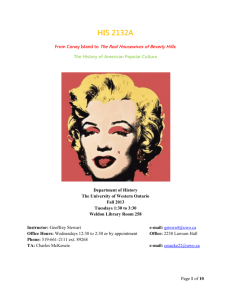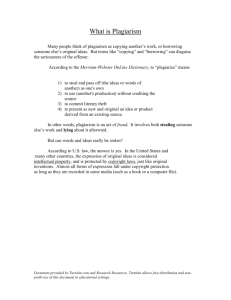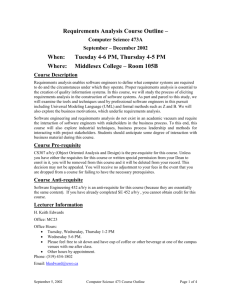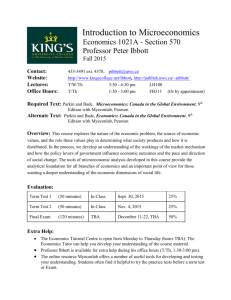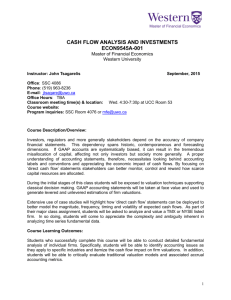Syllabus - Department of History
advertisement
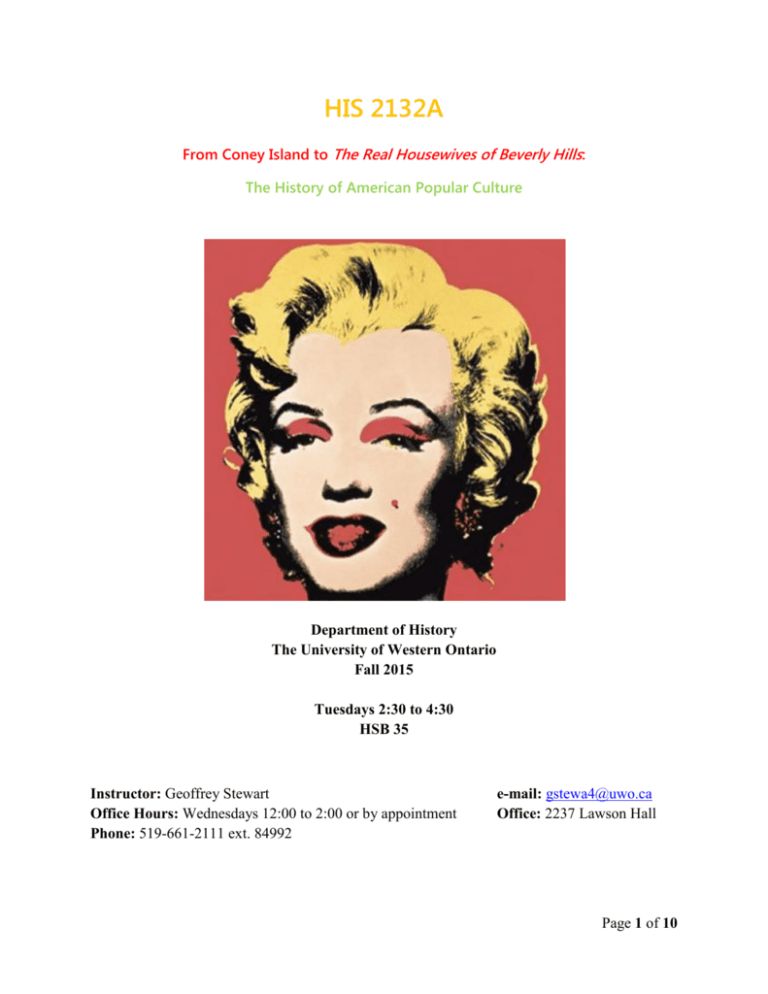
HIS 2132A From Coney Island to The Real Housewives of Beverly Hills: The History of American Popular Culture Department of History The University of Western Ontario Fall 2015 Tuesdays 2:30 to 4:30 HSB 35 Instructor: Geoffrey Stewart Office Hours: Wednesdays 12:00 to 2:00 or by appointment Phone: 519-661-2111 ext. 84992 e-mail: gstewa4@uwo.ca Office: 2237 Lawson Hall Page 1 of 10 Course Outline: From Buffalo Bill’s Wild West Show through Chuck Berry and Star Wars to Honey Boo Boo a fascination has existed with the best and worst of American popular culture. Love it or hate it, we are all exposed to its pervasive presence in some form or the other. This course traces the evolution of American popular culture from its emergence as an increasingly inclusive “mass” culture in the nineteenth century to the more fragmented and kinetic cultural productions that are disseminated by American media—literature, television, film, music, the internet, etc.—today. It will look at the ways in which different individuals and groups have used these various media to try to construct and exert a cultural influence on American life. It will attempt to determine what it is about this culture production that makes it “popular” and distinctly “American.” And it will consider how American popular culture has influenced politics, social movements and, most importantly, American identity at home and abroad. Page 2 of 10 Outcomes: Upon completing the course, students will be able to: • Identify and describe key figures, movements, events and trends that have defined American popular culture • Discuss, from a historical perspective, contemporary issues in American popular culture • Critically assess cultural productions and artifacts in through examinations, class discussions and a written assignment • Develop verbal and written communication skills Possible Textbooks: Lauren Rabinovitz, Electric Dreamland: Amusement Parks, Movies, and American Modernity (New York: Columbia University Press, 2012) Glenn C. Altschuler, All Shook Up: How Rock ‘n’ Roll Changed America (New York: Oxford University Press, 2003) John Leland, Hip: The History (New York: Harper Perennial, 2004) Page 3 of 10 Course Requirements: Midterm Exam 30% (October 20) Assignment 30% (Due November 17) Final Exam 40% Midterm and Final Exam: There will be one Midterm exam held in class on October 20 and a Final exam held during the December Exam period. Electronic devices are not permitted in either exam. Assignment: Students will write a 6 page (double-spaced) paper discussing either a cultural artifact or production and its significance to the evolution of American popular culture. The paper should use a minimum of five secondary sources (books, monographs, journal articles) from the Weldon Library including at least one journal article and book. On-line material is acceptable only in certain cases which must be verified by the professor or Teaching Assistant. All citations should appear as footnotes or endnotes and follow Chicago Style in format. The assignment will be due in class* on November 17. *Assignment Submission Hardcopies of all assignments are to be submitted in class as well as electronically to turnitin.com by the time that class has started. “Students agree that by taking this course all required papers may be subject to submission for textual similarity review to Turnitin.com for the detection of plagiarism. All submitted papers will be included as source documents in the Turnitin.com reference database solely for the purpose of detecting plagiarism of such papers. The terms that apply to the University’s use of the Turnitin.com service are described on the Turnitin.com website.” Late assignments will be penalized 5% the first day and 2% each subsequent day. Late assignments handed in after the last day of class will not be accepted. Students must complete this assignment to pass the course. Page 4 of 10 Communication: For reasons of privacy, students should communicate with the course instructor and TA using their UWO email addresses; all communications regarding the course will be sent to those email addresses, rather than to other accounts (Hotmail, Gmail, etc). Students should also regularly check the Announcements section on the course website for updates. I recognize that, for academic purposes, students rely heavily on electronic devices such as laptops or smartphones, and may be accustomed to using them in class for taking notes or following the readings. My assumption is that students will be respectful of their instructor and fellow students in using electronic devices, and will not engage in activities that distract those around them. In the event of disruptive use of such devices, I reserve the right to request that any device be turned off or put away; in extreme cases, a student may be asked to leave the lecture hall. Page 5 of 10 Lecture Schedule: September 15 – Introduction to the Course – What is Popular Culture? September 22 – Start the Presses: Popular Culture Forms in Antebellum America Readings: • • Lauren Rabinovitz, Electric Dreamland: Amusement Parks, Movies, and American Modernity (New York: Columbia University Press, 2012), 1-23 John Leland, Hip: The History (New York: Harper Perennial, 2004), 1-38 September 29 – From Buffalo Bill to Coney Island: The Emergence of Popular Culture in the United States Readings: • • Rabinovitz, Electric Dreamland, 24-65 Leland, Hip, 39-56 October 6 – The Jazz Age Readings: • • Rabinovitz, Electric Dreamland, 66-135 Leland, Hip, 57-86 October 13 – Radio Days Readings: • Rabinovitz, Electric Dreamland, 136-174 October 20 – Mid-Term October 27 – “Hooray for Hollywood” Readings: • • Glenn C. Altschuler, All Shook Up: How Rock ‘n’ Roll Changed America (New York: Oxford University Press, 2003), 3-34 Leland, Hip, 87-110 Page 9 of 10 November 3 – “Hail, Hail, Rock n’ Roll” Readings: • Altschuler, All Shook Up, 35-98 November 10 – Ward, June, Wally, the Beave and Jack Kerouac: Conformity and Contention in the 1950s Readings: • • Altschuler, All Shook Up, 99-130 Leland, Hip, 111-160 November 17 – The Age of Aquarius: Peace, Love and the Weather Underground Readings: • Altschuler, All Shook Up, 131-160 Assignments Due November 24 – Sucking in the Seventies: Watergate, the Fall of Saigon and the World According to Archie Bunker Readings: • Altschuler, All Shook Up, 161-192 • Leland, Hip, 161-222 December 1 – “Video Killed the Radio Star”: From the Me Generation to Generation X Readings: • Leland, Hip, 223-309 December 8 – Fifty Shades of Crazy: Jon Stewart, Fox News and The Real Housewives of Beverly Hills Readings: • Leland, Hip, 310-356 Page 10 of 10 ADDITIONAL STATEMENTS Prerequisites and Antirequisites: Unless you have either the requisites for this course, as described in the Academic Calendar description of the course, or written special permission from your Dean to enroll in it, you may be removed from this course and it will be deleted from your record. This decision may not be appealed. You will receive no adjustment to your fees in the event that you are dropped from a course for failing to have the necessary prerequisites. The Academic Calendar description of each course also indicates which classes are considered antirequisites, i.e., to cover such similar material that students are not permitted to receive academic credit for both courses. Academic Offences: Scholastic Offences are taken seriously and students are directed to read the appropriate policy, specifically, the definition of what constitute a Scholastic Offence, at the following Web site: http://www.uwo.ca/univsec/pdf/academic_policies/appeals/scholastic_discipline_undergrad.pdf Plagiarism: Students must write their essays and assignments in their own words. Whenever students take an idea, or a passage from another author, they must acknowledge their debt both by using quotation marks where appropriate and by proper referencing such as footnotes or citations. Plagiarism is a major academic offense (see Scholastic Offence Policy in the Western Academic Calendar). All required papers may be subject to submission for textual similarity review to the commercial plagiarism detection software under license to the University for the detection of plagiarism. All papers submitted will be included as source documents in the reference database for the purpose of detecting plagiarism of papers subsequently submitted to the system. Use of the service is subject to the licensing agreement, currently between The University of Western Ontario and Turnitin.com (http://www.turnitin.com). The following rules pertain to the acknowledgements necessary in academic papers. A. In using another writer's words, you must both place the words in quotation marks and acknowledge that the words are those of another writer. You are plagiarizing if you use a sequence of words, a sentence or a paragraph taken from other writers without acknowledging them to be theirs. Acknowledgement is indicated either by (1) mentioning the author and work from which the words are borrowed in the text of your paper; or by (2) placing a footnote number at the end of the quotation in your text, and including a correspondingly numbered footnote at the bottom of the page (or in a separate reference section at the end of your essay). This footnote should indicate author, title of the work, place and date of Publication and page number. Method (2) given above is usually preferable for academic essays because it provides the reader with more information about your sources and leaves your text uncluttered with parenthetical and tangential references. In either case words taken from another author must be enclosed in quotation marks or set off from your text by single spacing and indentation in such a way that they cannot be mistaken for your own words. Note that you cannot avoid indicating quotation simply by changing a word or phrase in a sentence or paragraph which is not your own. B. In adopting other writer's ideas, you must acknowledge that they are theirs. You are plagiarizing if you adopt, summarize, or paraphrase other writers' trains of argument, ideas or sequences of ideas without acknowledging their authorship according to the method of acknowledgement given in 'At above. Since the words are your own, they need not be enclosed in quotation marks. Be certain, however, that the words you use are entirely your own; where you must use words or phrases from your source; these should be enclosed in quotation marks, as in 'A' above. Clearly, it is possible for you to formulate arguments or ideas independently of another writer who has expounded the same ideas, and whom you have not read. Where you got your ideas is the important consideration here. Do not be afraid to present an argument or idea without acknowledgement to another writer, if you have arrived at it entirely independently. Acknowledge it if you have derived it from a source outside your own thinking on the subject. In short, use of acknowledgements and, when necessary, quotation marks is necessary to distinguish clearly between what is yours and what is not. Since the rules have been explained to you, if you fail to make this distinction, your instructor very likely will do so for you, and they will be forced to regard your omission as intentional literary theft. Plagiarism is a serious offence which may result in a student's receiving an 'F' in a course or, in extreme cases, in their suspension from the University. Medical Issues: The University recognizes that a student’s ability to meet his/her academic responsibilities may, on occasion, be impaired by medical illness. Please go to https://studentservices.uwo.ca/secure/medical_accommodations_link_for_OOR.pdf to read about the University’s policy on medical accommodation. This site provides links the necessary forms. In the event of illness, you should contact Academic Counselling as soon as possible. The Academic Counsellors will determine, in consultation with the student, whether or not accommodation should be requested. They will subsequently contact the instructors in the relevant courses about the accommodation. Once the instructor has made a decision about whether to grant an accommodation, the student should contact his/her instructors to determine a new due date for tests, assignments, and exams. SUPPORT SERVICES: Students who are in emotional/mental distress should refer to Mental Health@Western, http://www.uwo.ca/uwocom/mentalhealth/ for a complete list of options about how to obtain help. Please contact the course instructor if you require material in an alternate format or if you require any other arrangements to make this course more accessible to you. You may also wish to contact Services for Students with Disabilities (SSD) at 661-2111 x 82147 for any specific question regarding an accommodation. If you have any further questions or concerns please contact, Morgan Sheriff, Undergraduate Program Advisor, Department of History, 519-661-2111 x84999 or msherif5@uwo.ca
